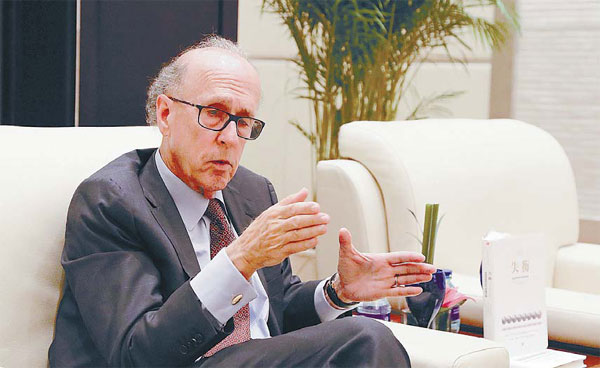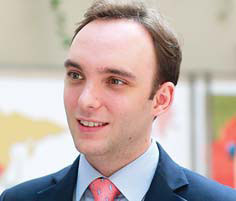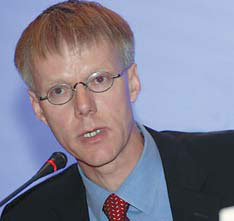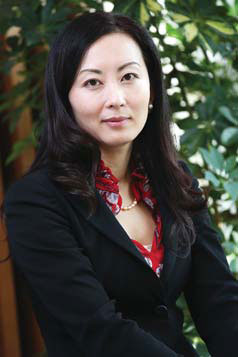Growth pangs
Updated: 2015-01-02 08:51
By Andrew Moody(China Daily Europe)
|
|||||||||||
While forecasts for China's GDP vary, one thing is clear: its slowdown is impacting the global economy
This year begins in a climate of considerable global economic uncertainty.
Twelve months ago there was some sense of the global financial crisis beginning to recede in the rearview mirror.
But in the last few months of 2014 its specter reappeared. Europe looks again as though it could be plunged into recession and there are renewed questions about whether the euro will survive in its current form.
The recent collapse in the oil price, while a fillip to oil importing countries, not only has negative effects on Russia but also African economies like Nigeria and Angola, which are major producers.
One of the few bright spots remains the United States, which grew at 3.5 percent in the third quarter whereas the fastest growing major European economy in 2014 was the United Kingdom at 3 percent.
Many economic commentators are moving to the view that recovery from the Great Recession might be a 15- to 20-year event, rather than a 5- to 10- year one that might have been more the consensus a year ago.
China shielded itself from the 2008 downturn with the largest economic stimulus package in history, from which there is still an overhang of local government debt.
But the main focus is now on its GDP growth, which is seen as a large contributor to growth elsewhere in the world.
In the third quarter of last year, China grew by 7.3 percent - the weakest quarterly growth for five and a half years - and when the National Bureau of Statistics releases the figure for the full year later this month, it is likely it will have missed its 7.5 percent target.
There is much anticipation as to what target the government will set for 2015 in March at the annual meetings of the National People's Congress and the Chinese People's Political Consultative Conference.
The majority of commentators believe it will either settle on 7 percent or opt for flexibility with a range of between 7 and 7.2 percent or, more likely, 7 to 7.5 percent.
The People's Bank of China, the central bank, forecast 7.1 percent growth for 2015 in a recent research report.
Stephen Roach, former chairman of Morgan Stanley Asia and author of Unbalanced: The Codependency of America and China, believes the government target will be 7 percent and the outcome will be very close to that.
"It could be a little less than that and it also could be a little more. The government has a lot of policy levers to deploy to ensure it keeps it at that level and I think there is still a lot of natural growth left in the economy, particularly from urbanization.
"For me, what is more important than the actual number is the mix of the growth and the need for evidence of a further move to services and consumption and away from exports."
Jian Chang, chief China economist for Barclays in Hong Kong, also thinks the target will be 7 percent but is not sure whether the actual outcome will reach that level.
She believes China is entering an era where there will be step-change declines in growth with it falling to 6.6 percent in 2016, 6 percent in 2017 and then settling in the range of between 5 and 6 percent in the years up to 2022.
"I think we still have a situation where 7 percent is a psychological figure but I think it is a good thing the economy is slowing and allowing restructuring to actually happen. We are moving away from the old economy to the new one."
Not everyone, however, believes that the China economy is on a slower growth trajectory.
Chen Yuyu, Professor of Applied Economics at Guanghua School of Management at Peking University, believes policymakers will be able to keep growth at above 7 percent.
"I think there will be steady growth. I guess the decisionmakers will revise the target growth rate a little bit downward. I think they will avoid growth under 7 percent and it might be somewhere between 7 and 7.5 percent."
Martyn Davies, chief executive officer of Frontier Advisory, a leading research, strategy and advisory firm that specializes in emerging markets, based in Johannesburg, admits to taking a contrarian position. He thinks growth could be higher in 2015 than 2014.
"I am expecting growth to tick up by maybe one or two decimal points. That is because the government has had in place a couple of policy instruments to cool off growth such as restraining the property market and I think they will release the handbrake slightly.
"I am actually quite bullish about the Chinese economy. I think there is still a lot of runway left."
A slowing China - if that is the actual outcome - has obvious implications for the global economy. One of the factors behind the slump in commodity prices, particularly oil, in 2014, according to many economists, has been the relatively weaker growth in the world's second-largest economy.
"I think the adjustment that China is making from its old manufacturing and export model to a new one based around services will put downward pressure on resource economics such as Russia, Australia, Brazil, Canada and some African economies," adds Roach, now a senior fellow at Yale University's Jackson Institute for Global Affairs.
Davies at Frontier Advisory says China's slowing growth is already challenging some of the perceptions about Africa's growth being driven by a young population and new middle class consumers in reports such as Lions on the Move: The Progress and Potential of African Economies by global consultants McKinsey & Co that was published in 2010.
"Resources is the only show in town for many of the economies in my part of the world. Countries like Nigeria have based their budgets on oil being $125 a barrel and upwards and look now where it is. These guys are going to be in trouble.
"McKinsey seemed to create this idea that you get rich by spending but you have only to look at Asian economies like China to see that it is not true. You get rich by saving."
The main focus in 2015 might not be on China but Europe with the prospect of the eurozone plunging back into recession.
Its growth was only 0.2 percent in the third quarter and its three biggest economies Germany, France and Italy - saw manufacturing decline in November.
George Magnus, senior independent economist for Swiss bank UBS in London, says the medium-term outlook for Europe is bleak. He believes growth in the eurozone will be little more than 1 to 1.25 percent in 2015.
"Europe may not be too far from recession. The outcome for the year could be slightly better because of the latest plunge in oil prices. If so, I think it would be temporary. There is no change really in the medium term outlook, which is for low growth, stagnation or worse."
Magnus also believes slowing growth in China does not help the problems Europe is now facing.
"Europeans may have a tough time selling goods into China which may feed back into European and, in particular, Germany's prospects, given the latter is a major exporter to China."
Louis Kuijs, chief economist, Greater China, for the Royal Bank of Scotland in Hong Kong, is concerned Europe going into a recession could also impact China. Some 16 percent of China's exports currently go to Europe.
"If it were to happen, it would be a major problem for China. It would mean the US remained the only driver of the global recovery and as recent experience has shown the US cannot now pull the global economy by itself, so global trade would be quite subdued depressing China's exports."
Gary Liu, executive deputy director of the China Europe International Business School Lujiazui Institute of International Finance, says there might be a currency effect on China if Europe were to go into recession.
"If it happens, it will blow China's exports, although that might not be that significant for the economy as a whole because China's economy is now driven more by domestic demand than by exports," he says.
"If exports do drop sharply, the renminbi may depreciate to mitigate the effects. A slowing China, however, might have more of an impact on Europe since China's demand is a key powerhouse for global economic growth."
Duncan Innes-Ker, Asian regional editor for the Economist Intelligence Unit in London, says there are major problems on the horizon for Europe. The EIU forecast for the EU is that it will grow 1.6 percent in 2015, compared to 1.3 percent last year.
"There are a lot of risks clouding that forecast. Lower oil prices should help to provide a boost to consumption in the eurozone but Germany's opposition to full quantitative easing is making it hard for the European Central bank to face down deflationary pressures."
There will be increasing focus on Japan in 2015. Japanese Prime Minister Shinzo Abe won a new mandate in the December's general election for his policy to revive the world's third-largest economy from its 20-year stagnation. On Dec 27, Japan's Cabinet gave the go-ahead for a new 3.5 trillion yen (23.8 billion euros) stimulus. Japan's GDP growth halved to a year-on-year 1.9 percent in the third quarter, compared to 3.8 percent in the second quarter, bringing into question the Abenomics strategy.
Kuijs at RBS says it is important for the global economy as well as China that Abenomics works.
"Japan remains a very large economy. A thriving Japanese economy would be a plus for China even though the importance of Japan as a trading partner and as a source of FDI (foreign direct investment) is, in relative terms, not as large as 15 years ago," he says.
Innes-Ker at EIU is skeptical about any sort of revival of the Japanese economy this year and believes growth will only reach 1 percent at best.
"An economically reinvigorated Japan would be a major market for Chinese exports but unfortunately the prospect of Abenomics sparking a resurgence still look remote."
He believes Japan's current state carries warnings for China's policymakers if they do not push strongly ahead with financial reform. This is one of the reasons why Japan has had such a long period of decline, he argues.
"Japan's failed efforts to try and address its problems through slow and gradual reform have contributed to the creeping policy paralysis that Abenomics is trying to shake up."
Oliver Barron, head of research for the London-based investment bank NSBO, in Beijing, also believes the situation in Japan carries omens for China.
"China still needs to take lessons from the bursting of the Japanese housing bubble in the 1990s and the subsequent banking crisis. China clearly must reduce the importance of property on growth, but weaning itself off property-driven growth has not been easy," he says.
"Each time the sector has slowed in recent years, the government has been forced to stimulate it because of the lack of other growth drivers."
Some believe there will be evidence of other new trends beginning to emerge in 2015.
Chen at Guanghua School believes the world is on the brink of a new rapid technological revolution that will make some of the current economic woes seem like short-term considerations.
One of the drivers will be 40 million new college graduates emerging from China over the next five years, more than the population of many European countries.
"This will dramatically change the industrial structure of China and have implications for the global economy. It will cause short-term difficulty for China because they will be difficult to absorb but they will eventually help produce a rapid technological revolution. This trend will make the global financial crisis seem like a secondary issue."
In terms of the overall global outlook, any chance of a major post-financial crisis revival in 2015 now seems to have receded.
Magnus at UBS thought the financial crisis would resolve itself within a decade but now thinks that will be unlikely.
"I said the consequences and the fix would last a decade. So, in 2014, we are six years into it and technically, my prediction would suggest we might emerge in or by 2018. I'm not convinced that will be the case now," he says.
"The financial crisis has been exacerbated by the euro crisis, the structural issues (it caused) are proving a devil to resolve, emerging markets have been caught up in the growth slowdown, and our political mindset is stuck in the 1930s. At the very least I expect 2015 and 2016 to remain difficult years with many setbacks."
Kuijs at RBS also believes the outlook for global growth not just in 2015 but for the next decade could be grim.
"I am not a strong believer in economic cycles with a certain amplitude. But I do think that, all in all, there are quite a few reasons why economic growth may be considerably lower in the coming 10 years than in the previous 10 years, especially in the developed countries, many of whom are struggling with unfavorable demographics, deleveraging and unpleasant interaction between fiscal problems and slow growth," he says.
Barron at NSBO is also concerned about overall prospects.
"Everywhere in the world, central bankers are trying to weaken their own currency to support economic growth. In no way could we be fooled into believing this is even close to a healthy global economy, and a 15 to 20 year recovery from the global financial crisis sounds much more accurate than a 5 to 10 year one."
Roach at Yale University says there is a risk that any recovery we have so far seen from the financial crisis has been built solely on quantitative easing measures.
"The juncture we are at that fascinates me the most is that I think the market is starting to come to grips with the distortions that were put in place by central banks in the aftermath of the crisis. Central banks have been setting asset prices really since early 2009 and not market forces."
"The first five years of post-crisis recovery has seen asset prices dramatically out-perform the performance of actual economies and this can't continue. Markets are starting to recognize this and the oil price slump is the first clear sign of this."
Innes-Ker at EIU believes it is a mixed picture and what we are likely to see for the foreseeable future is a multi-speed world.
"Economic fortunes are beginning to diverge between countries. The US is coming out of its slump and looking increasingly vigorous but others, like the eurozone countries, are still struggling," he says.
"With US interest rates set to rise, we will see a fundamental shift in monetary conditions across the world that will have major repercussions, especially for vulnerable emerging markets."
andrewmoody@chinadaily.com.cn
|
Stephen Roach, former chairman of Morgan Stanley Asia, believes the government target in 2015 will be 7 percent. Provided to China Daily |
|
Chen Yuyu, Professor of Applied Economics at Guanghua School of Management at Peking University. Wang Jing / China Daily |
|
George Magnus, senior independent economist for UBS. Nick J. B. Moore / for China Daily |
|
Duncan Innes-Ker, regional editor, Asia, The Economist Intelligence Unit. Liu Zhe / China Daily |
|
Oliver Barron, head of research for NSBO, in Beijing. Feng Yongbin / China Daily |
|
Martyn Davies, chief executive officer of Frontier Advisory. Mark Wessels / for China Daily |
|
Louis Kuijs, chief economist, Great-er China, Royal Bank of Scotland. Provided to China Daily |
|
Gary Liu, executive deputy director of the CEIBS Lujiazui Institute of International Finance. Provided to China Daily |
|
Jian Chang, chief China economist for Barclays. Edmund Tang / for China Daily |
(China Daily European Weekly 01/02/2015 page4)
Today's Top News
Credit Suisse's China partner under investigation
Belarus' Domracheva named Europe's Athlete of 2014
China's influence in global film market expanding: report
Euro slumps amid concern over Greek exit after election
German gallery presents Calligraphy in Chinese Contemporary Art
Export quota system for rare earths abolished
New York City community rallies around Liu family
Stock link bid for HK, Shenzhen
Hot Topics
Lunar probe , China growth forecasts, Emission rules get tougher, China seen through 'colored lens', International board,
Editor's Picks

|

|

|

|

|

|














